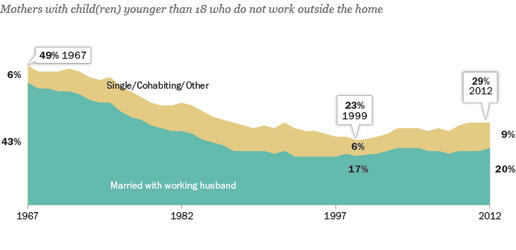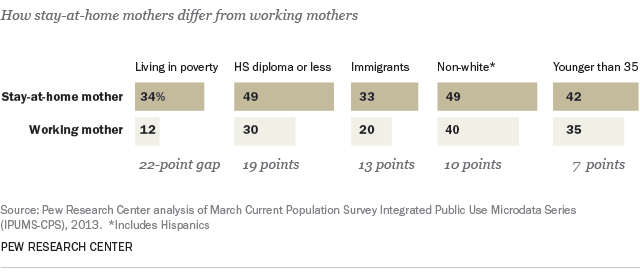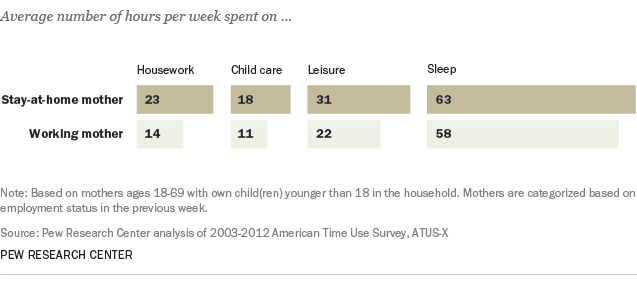The number of stay-at-home moms is on the rise, but it's complicated
Pew


A free daily email with the biggest news stories of the day – and the best features from TheWeek.com
You are now subscribed
Your newsletter sign-up was successful
More mothers in the U.S. are staying home to raise their children than in 2000, an unusual rise documented in a new survey from the Pew Research Center. But the increase to 29 percent, from a low of 23 percent 14 years ago, doesn't mean women are putting their outside careers on hold en masse. And the ones who are, through choice or necessity, aren't the "opt-out" moms fussed over in the media.
In fact, stay-at-home moms (SAHMs, colloquially) are typically younger, poorer, and less-educated than mothers who work outside of the home; almost half aren't white, and a third immigrated to the U.S.:

And those "opt-out mothers"?
The Week
Escape your echo chamber. Get the facts behind the news, plus analysis from multiple perspectives.

Sign up for The Week's Free Newsletters
From our morning news briefing to a weekly Good News Newsletter, get the best of The Week delivered directly to your inbox.
From our morning news briefing to a weekly Good News Newsletter, get the best of The Week delivered directly to your inbox.
In 2012, nearly 370,000 U.S. married stay-at-home mothers (with working husbands) had at least a master’s degree and family income exceeding $75,000. This group accounted for 5 percent of married stay-at-home mothers with working husbands.... These women stand out from other married stay-at-home mothers in that they are disproportionately white or Asian. About seven-in-ten (69 percent) are white, and fully 19 percent are Asian. Only 7 percent are Hispanic, and 3 percent are black. [Pew]
There are a lot of fascinating data points in the report, especially if you're interested in why women stay home and which demographics believe that's better for kids. But I'll leave you with this intriguing chart:

To understand why SAHMs apparently spend only seven hours a week more on child care (and nine more on housework) than their working-outside-the-home peers, turn to Chapter 3, not Gwyneth Paltrow.
A free daily email with the biggest news stories of the day – and the best features from TheWeek.com
Peter has worked as a news and culture writer and editor at The Week since the site's launch in 2008. He covers politics, world affairs, religion and cultural currents. His journalism career began as a copy editor at a financial newswire and has included editorial positions at The New York Times Magazine, Facts on File, and Oregon State University.
-
 5 cinematic cartoons about Bezos betting big on 'Melania'
5 cinematic cartoons about Bezos betting big on 'Melania'Cartoons Artists take on a girlboss, a fetching newspaper, and more
-
 The fall of the generals: China’s military purge
The fall of the generals: China’s military purgeIn the Spotlight Xi Jinping’s extraordinary removal of senior general proves that no-one is safe from anti-corruption drive that has investigated millions
-
 Why the Gorton and Denton by-election is a ‘Frankenstein’s monster’
Why the Gorton and Denton by-election is a ‘Frankenstein’s monster’Talking Point Reform and the Greens have the Labour seat in their sights, but the constituency’s complex demographics make messaging tricky
-
 Nobody seems surprised Wagner's Prigozhin died under suspicious circumstances
Nobody seems surprised Wagner's Prigozhin died under suspicious circumstancesSpeed Read
-
 Western mountain climbers allegedly left Pakistani porter to die on K2
Western mountain climbers allegedly left Pakistani porter to die on K2Speed Read
-
 'Circular saw blades' divide controversial Rio Grande buoys installed by Texas governor
'Circular saw blades' divide controversial Rio Grande buoys installed by Texas governorSpeed Read
-
 Los Angeles city workers stage 1-day walkout over labor conditions
Los Angeles city workers stage 1-day walkout over labor conditionsSpeed Read
-
 Mega Millions jackpot climbs to an estimated $1.55 billion
Mega Millions jackpot climbs to an estimated $1.55 billionSpeed Read
-
 Bangladesh dealing with worst dengue fever outbreak on record
Bangladesh dealing with worst dengue fever outbreak on recordSpeed Read
-
 Glacial outburst flooding in Juneau destroys homes
Glacial outburst flooding in Juneau destroys homesSpeed Read
-
 Scotland seeking 'monster hunters' to search for fabled Loch Ness creature
Scotland seeking 'monster hunters' to search for fabled Loch Ness creatureSpeed Read
